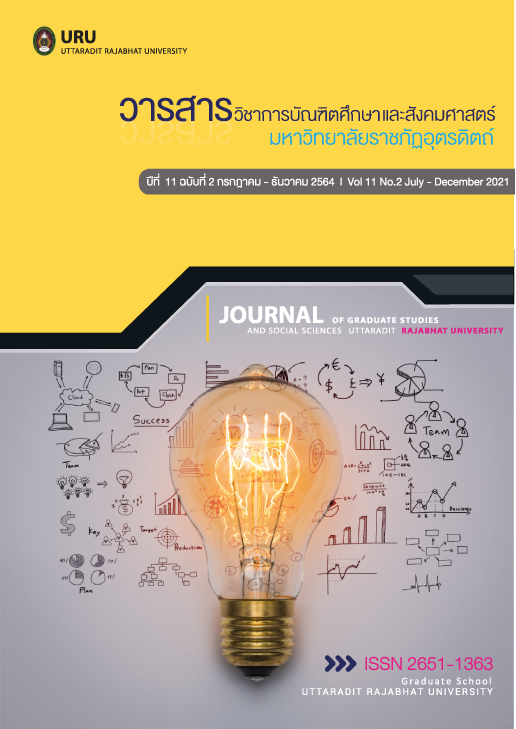The first is to develop a learning management plan of creative business project to develop local intellectual products of secondary students.
-
Keywords:
แผนการจัดการเรียนรู้, โครงงานธุรกิจสร้างสรรค์, ผลิตภัณฑ์ภูมิปัญญาชาวบ้านAbstract
This article presents three major objectives. The first is to develop a learning management plan of creative business project to develop local intellectual products of secondary students. The second objective concerns studying skills to formulate a creative business project to develop local intellectual products of secondary students. The third objective aims to explore the students’ satisfaction with learning activities on a creative business project to develop local intellectual products of secondary students.
Employing a quantitative methodology, this research used a concept of experimentalism proposed by John Dewey as a major framework. In terms of demography, it focuses on Thai Rath Witthaya 99 School (Ban Mae Suya) in Mae Hong Son. The population under the research includes 23 students of grade 8 in the second semester of the academic year 2008. Research tools feature plans on learning management in the form of creative business project to develop local intellectual products. There are 7 plans with a total hour of 20. The quality rate was calculated by 5 specialists, using fundamental statistics to analyze the data, namely average (µ) and standard deviations (Ó).
Results concerning the rate of evaluation on suitability of an economics learning management plan of creative business project to develop local intellectual products of secondary students showed the average of 4.81 and the standard deviations of 0.30. Therefore, the results of the plan were regarded as the highest.
In terms of results of the study on the creative business project to develop local intellectual products of secondary students, the overall average was 4.81 and the standard deviations 0.30, hence the highest skill on making the project. When considering each process, it was found that 3 processes with the highest average were the fourth step: revision (μ = 5.00), the third one: action (μ = 4.86) and the fifth: presentation (μ = 4.86) respectively.
The overall results of evaluation regarding students’ satisfaction with organizing learning activities on the creative business project to develop local intellectual products of secondary students were high with the average of 4.93 and the standard deviations 0.30. When considering each point, it was found that the opinion belonged to the highest satisfaction. The average can be arranged according to the highest average rate as the followings. Teachers had techniques on classroom administration and encouraged students to practice their rights under limits (μ = 5.00). Teachers created an atmosphere where learners felt successful with their work, resulting in their better learning ability (μ = 5.00). Students had a chance to explore the community to find an issue for the project (μ = 5.00). Project-based activities enabled students to take part in action by themselves (μ = 5.00). Students could apply knowledge to their real life (μ = 5.00). Students felt proud of local intellectual products (μ = 5.00). Students had skills and used experiences gained from the project for their future careers (μ = 5.00). Students were proud of their own intellectual products (μ = 5.00). Students realized values of their own local intellect (μ = 5.00). Students could summarize the project according to its regulations (μ = 5.00). Students could present their project in classroom creatively (μ = 5.00).
References
กุศลาภรณ์ จันทร์ภิรมย์. 2547. การสร้างแผนการจัดการเรียนรู้แบบโครงงานเรื่อง ผลิตภัณฑ์จากวัสดุท้องถิ่น สำหรับนักเรียนชั้นประถมศึกษาปีที่ 6. เชียงใหม่ : บัณฑิตวิทยาลัย มหาวิทยาลัยเชียงใหม่.
เกียรติสุดา ศรีสุข. 2552. ระเบียบวิธีวิจัย. เชียงใหม่ : โรงพิมพ์ครองช่าง.
เขมกร ดวงปูนันท์. 2557. การพัฒนาแผนการเรียนรู้แบบโครงงาน เรื่อง สิ่งประดิษฐ์จากกระดาษรีไซเคิลสำหรับนักเรียนชั้นประถมศึกษาปีที่ 6. เชียงใหม่ : บัณฑิตวิทยาลัย มหาวิทยาลัยเชียงใหม่.
คริสตมาส เตชะ. 2557. การใช้กิจกรรมการเรียนการสอนแบบโครงงานเพื่อพัฒนาทักษะอาชีพของผู้เรียนที่มีปัญหาในการเรียนรู้ ระดับชั้นประถมศึกษาปีที่ 4. เชียงใหม่ : บัณฑิตวิทยาลัย มหาวิทยาลัยเชียงใหม่.
ชัยรินทร์ ชัยวิสิทธิ์. 2545. การวิจัยเชิงปฏิบัติการแบบมีส่วนร่วมเพื่อสร้างเสริมค่านิยมตามแนวคิดเศรษฐกิจพอเพียงให้นักเรียนและชุมชนด้วยโครงงานอาชีพ. เชียงใหม่ : บัณฑิตวิทยาลัย มหาวิทยาลัยเชียงใหม่.
ตรีพร ชาติแสนปิง. 2547. การใช้ภูมิปัญญาชาวบ้านในการแสวงหารายได้ชุมชนเพิ่มเติม : กรณีศึกษาการผลิตน้ำดื่มบ่อปุ๊ ของกองทุนหมู่บ้านบ้านบ่อปุ๊องค์การบริหารส่วนตำบลดอนแก้ว. เชียงใหม่ : บัณฑิตวิทยาลัย มหาวิทยาลัยเชียงใหม่.
นพรัตน์ สัจจะวิสัย. 2558. การจัดการความรู้เกี่ยวกับภูมิปัญญาท้องถิ่นด้านหัตถกรรมของเทศบาลเมืองต้นเปา อำเภอสันกำแพง จังหวัดเชียงใหม่. เชียงใหม่ : บัณฑิตวิทยาลัย มหาวิทยาลัยเชียงใหม่.
ประทุม อังกูรโลหิต. 2528. ปรัชญาปฏิบัตินิยม: รากฐานปรัขญาการศึกษาของจอห์น ดิวอี้. กรุงเทพฯ : สำนักพิมพ์จุฬาลงกรณ์มหาวิทยาลัย.
ไพฑูรย์ สินลารัตน์. 2556. การศึกษาเชิงสร้างสรรค์และผลิตภาพ. กรุงเทพฯ : โรงพิมพ์แห่งจุฬาลงกรณ์มหาวิทยาลัย.
ยุพินธ์ บุญเทพ. 2556. การจัดการภูมิปัญญาท้องถิ่นตามหลักสูตรสถานศึกษาของโรงเรียนน้ำดิบวิทยาคม จังหวัดลำพูน. เชียงใหม่ : บัณฑิตวิทยาลัย มหาวิทยาลัยเชียงใหม่.
วิจารณ์ พานิช. 2555. วิถีสร้างการเรียนรู้เพื่อศิษย์ ในศตวรรษที่ 21. กรุงเทพฯ : มูลนิธิสดศรี-สฤษดิ์วงศ์.
สำนักงานคณะกรรมการการศึกษาแห่งชาติ. 2543. รายงานการเสวนาทางวิชาการ มิติใหม่ของการประเมินผล: การเรียนที่เน้นผู้เรียนเป็นศูนย์กลาง. กรุงเทพฯ : มปพ.
สำนักวิชาการและมาตรฐานการศึกษา กระทรวงศึกษาธิการ. 2551. ตัวชี้วัดและสาระการเรียนรู้แกนกลาง กลุ่มสาระการเรียนรู้สังคมศึกษา ศาสนา และวัฒนธรรม ตามหลักสูตร แกนกลางการศึกษาขั้น พื้นฐาน พุทธศักราช 2551. กรุงเทพฯ : โรงพิมพ์ชุมนุมสหกรณ์ การเกษตรแห่งประเทศไทย จำกัด.
สำนักวิชาการและมาตรฐานการศึกษา กระทรวงศึกษาธิการ. 2553. แนวทางการจัดการเรียนรู้เพื่อพัฒนา ทักษะการคิด ตามหลักสูตรแกนกลางการศึกษาขั้นพื้นฐาน พุทธศักราช 2551 กลุ่มสาระการ เรียนรู้สังคมศึกษา ศาสนา และวัฒนธรรม. กรุงเทพฯ : โรงพิมพ์ชุมนุม สหกรณ์การเกษตรแห่ง ประเทศไทย จำกัด.
Downloads
Published
How to Cite
Issue
Section
License
แนวคิดและทัศนะในบทความเป็นความรับผิดชอบของผู้เขียนบทความ การนำบทความหรือส่วนหนึ่งของบทความไปตีพิมพ์เผยแพร่ ให้อ้างอิงแสดงที่มา และข้อมูลเกี่ยวกับผู้เขียนบทความ




